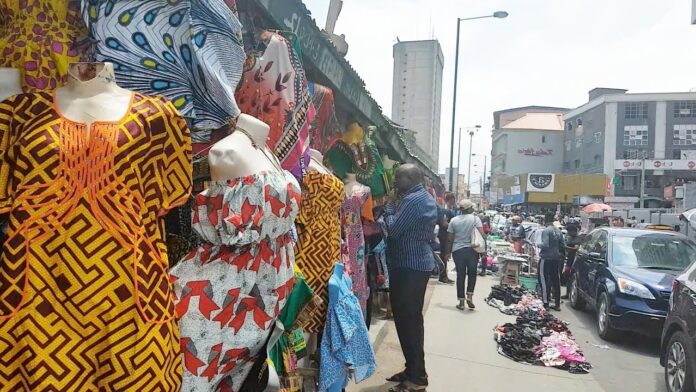Lagos traders reeling from multiple levies by govt officials and private touts
By Jeph Ajobaju, Chief Copy Editor
Traders in Lagos, particularly at Ikeja Market and the popular Balogun Market on the Island, are groaning under multiple taxation from government officials and touts working for private interest groups.
Some traders at Balogun complained of being forced to pay between N50,000 and N50,000 tax in six months and N100,000 or more yearly.
The traders also spoke of being compelled to pay N700 levies daily without which they will be forced to vacate their stalls.
“We pay N50,000 or N60,000 in six months, we pay N100,000 or above yearly,” claimed a trader at Balogun who identified himself simply as Emmanuel.
One Iya Biliki disclosed they pay weekend levies in addition to yearly taxes, The PUNCH reports.
“For me, per year they collect N50,000 and every Saturday and Sunday they collect N300 from traders. What they are doing is illegal but the thing is that we don’t have any other choice because we don’t have shops in the market,” she lamented.
Mummy Mercy, a trader at Ikeja Market, disclosed “We pay to stay on the roadside. Even the hawkers pay money daily. Some of them pay N500 daily while some of them pay N200 daily.
“There is nothing free in Lagos. We traders that stay close to the rail tracks pay N400 daily.”
Governor Babajide Sanwoolu’s Chief Press Secretary Gboyega Akosile said: “Every working person must pay tax, whether petty trading or big stores” without elaborating on multiple taxes by government officials and levies by touts.
_________________________________________________________________
Related articles:
644 retirees get N2b benefits in Lagos after waiting over 16 years
CSOs berate Sanwo-Olu over arrest of street hawkers
UNICEF alerts rich Lagos has 200,000 stunted, wasted children
__________________________________________________________________
Touts extort N123b yearly from Lagos commercial vehicle operators
Levy by touts called Agberos on private commercial vehicles in Lagos generates N123.08 billion yearly, more than the combined budgets of Nasarawa, Niger, and Yobe, according to a report by the International Centre for Investigative (ICIR).
Members of the Lagos chapter of the National Union of Road Transport Workers (NURTW) share this huge sum they extort from private operators of commercial buses, motorcycles, and tricycles.
The amount does not include money other extortioners levy on hawkers, articulated vehicles, and persons who buy goods in certain markets.
ICIR recorded a total 75,000 buses which pay N3,000 daily; 37,000 motorcycles (N1,800); and 50,000 tricycles (N600).
These add up to N82.12 billion for buses, N8.1 billion (motorcycles), and N32.9 billion (tricycles) yearly; a grand total of N123.078 billion yearly.
“It is a highly connected and well-organised syndicate,” an NURTW insider said.
“Take Idumota for example, some agberos work in the office, others work on the streets; some work in the morning, some are constantly on afternoon shifts.
“Some also have days that they work. Although there is a fixed price, the rule of the game is that the agberos charge the drivers based on the amount drivers charge passengers.”
He added that in Idumota alone, there are over seven chairmen who get deliveries from the boys who work the street.
“The boys have delivery targets, which is the reason they act rudely to drivers and passengers alike.”
To work with them, he added, one must know one NURTW Chairman or another renowned hoodlum.
He cited the case of a young man who went to Badagry to get black magic fortifications so that he could be effective on the job.
Emmanuel Francis, a commuter, expressed concern over the activities of NURTW members and urged the federal government to regulate their activities.
Lagos Internal Revenue Service spokesman, Monsurat Amasa, said she could not comment on the amount the NURTW generates, but explained that as a part of the informal sector, the body pays tax to the government.







